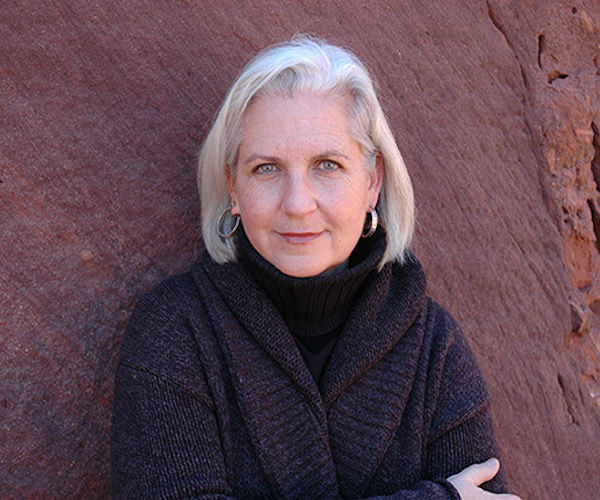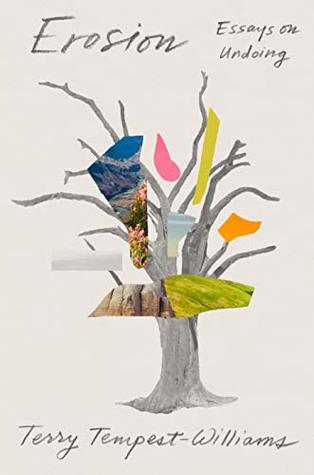Book Feature: Terry Tempest Williams on the Agonies of “Erosion”
By Robert Israel
Terry Tempest Williams thinks that we must seize opportunities to save an increasingly endangered world — we don’t have a choice to feel powerless against the forces that seek to exploit and destroy the beauty of life on this planet.

Author Terry Tempest Williams. Photo: Debra Anderson
Terry Tempest Williams — environmental activist, professor, and author — strode tentatively onto Cambridge’s Brattle Theatre stage earlier this month. In a voice just a few decibels above a whisper, she declared she was “nervous.” An audience member called out: “Aww, come-on! We’re friendly!” But that did not immediately calm her. A Utah native — tall, lean, crowned with a shock of silvery white hair — she gripped her newly published book of essays, Erosion: Essays of Undoing (Farrar, Straus and Giroux) in her hands. She paused. Her poise asserted itself as her stage fright passed.
In 2020, Williams enters into her fourth year as a writer-in-residence at Harvard Divinity School. She lost her position as a professor at the environmental humanities department the University of Utah in 2016, for what she claims were “political reasons.” (The university complained that her course, which involved taking students for fieldwork into Utah’s rugged canyon lands, was a liability they could not afford.) She’s been living in “exile” ever since, admitting in an interview with the Harvard Gazette that she has suffered from “homesickness.” Indeed, suggestions of her malaise were keenly felt throughout her presentation.
It is Utah where Williams found her voice, where she began her career as a prolific writer, as a social activist on behalf of marginalized people, endangered wildlife, and where she has been a very vocal and visible opponent of government malfeasance. Although her book chronicles her travels — to such far-flung places as Rwanda, for example, to observe the endangered gorilla population — it is in Utah where her heart and spirit are at their most vital. I thought of the late artist Georgia O’Keeffe, who spent most of her life in New Mexico living at a ranch outside Taos Pueblo. After traveling to Washington, DC, to accept an award, O’Keeffe declared in an interview that she was homesick for her ranch. When she stared up at the night sky, “the stars look so much better there.”
 Williams has the same elemental affinity for the wide-open spaces of the American West. She described her relationship to the native peoples in Utah. She visits them for advice, and shared that, even after decades of broken promises, they continue to look for signs in the natural world that enable them to live deeply spiritual lives.
Williams has the same elemental affinity for the wide-open spaces of the American West. She described her relationship to the native peoples in Utah. She visits them for advice, and shared that, even after decades of broken promises, they continue to look for signs in the natural world that enable them to live deeply spiritual lives.
She is not alone in her adoration of the West. When she asked the audience if anyone was familiar with her home turf, many raised their hands. This landscape of stark, open spaces, she explained, with its canyons and rivers, affords her a chance to listen to the “pulse of the earth.” She played a recording of that very pulse, taken from a rock tower outside of Moab, where seismologists captured a distinctive vibration that comes from deep within the earth’s core. Williams believes, as human beings, we need to listen to our own pulses, our hearts and spirits, because they are connected to the earth’s center.
The majority of her talk at the Brattle focused on her reading an essay that painfully chronicled the loss of her beloved brother, Dan Dixon Tempest. He was an addict, she said, who committed suicide. Erosion is dedicated to him and the piece is titled, “A Beautiful, Rugged Place: Erosion of the Body.” In it, Williams summons all her powers as a writer (and they are considerable) to offer readers a poetic, yet unsparing, account of attending to the final details of Dan Tempest’s cremation.
At the reading’s conclusion, it became clear that Williams’ grieving has not abated. And she chronicles other losses as well, particularly the pitiless degradation of the environment. Her melancholy infuses Erosion with a sense of the elegiac. Yet there are also calls to joy. And she thinks that we must seize opportunities to save an increasingly endangered world — we don’t have a choice to feel powerless against the forces that seek to exploit and destroy the beauty of life on this planet.
Williams told the Harvard Gazette that she no longer practices her Mormon faith. She declared, however, that she still embraces spirituality. At Harvard, she said, specifically at the Center for the Study of World Religions, where she teaches, she has found a community of scholars and students with whom she freely shares this belief. Williams’s writing, in the splendid Erosion and elsewhere, is a way to expand this fellowship with the divine.
Robert Israel writes about theater, travel, and the arts, and is a member of Independent Reviewers of New England (IRNE). He can be reached at risrael_97@yahoo.com.

I have been reading through this fine collection. Besides the essay that Bob suggests, I would recommend the Q & A “What Love Looks Like: Erosion of Safety: A Conversation with Tim DeChristopher.” The guy was sentenced to jail because of “an act of protest, an act of imagination, and an act of true resistance” Real change in confronting climate change will only come about via a far more engaged and active citizenry — and that will no doubt demand civil disobedience along with mass demonstration. Which means there must be a rejection of ‘moderation’ and the sheltering pieties of ‘sustainability.’
As DeChristopher notes about “the center.” “The center is this balancing point between the climate scientists on one side saying, ‘This is what needs to be done,’ and ExxonMobil on the other. And so the center is always going to be less than what’s required for our survival.”
Williams also includes a scathingly true observation from South African writer Breyten Breytenbach: “You Americans have mastered the art of living with the unacceptable.”